Trent Bridge '05 is the new Headingley '81
Gideon Haigh's Ashes diary for the week ending August 20
Gideon Haigh
23-Aug-2005
Sunday August 28
|
|
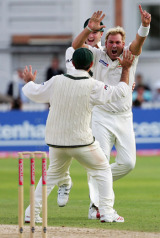
|
English cricket devotees will find any excuse to mention Headingley '81.
Today's events may have cured them of the habit. Twenty-four years ago at Leeds, Australia enforced the follow-on, made a good start on achieving a target of 130 to win, lost a bunch of wickets, rallied briefly then bottled it. Today at Nottingham, having enforced the follow-on, England made a good start on achieving a target of 129, lost a bunch of wickets, and very nearly did the same. At 116 for 7, Ashley Giles and Matthew Hoggard looked a frail last line of resistance indeed.
There were other historical echoes, as well. Jason Gillespie might have the physical likeness, but Shane Warne had clearly imbibed of the spirit of Fred Spofforth at the Oval 1882: 'This thing can be done.' Geraint Jones' shot recalled Ted Peate's post-match explanation of his wild, terminal swing: 'I were thinkin' as 'ow they'd all say 'good owd Ted' when it went over t'pavilion'. Ricky Ponting may have had a reprise in mind of the 1902
series when he threw the ball to Shaun Tait. Anyone for Tait's Match?
At the Oval in 1882, it is famously reported, a man dropped dead of excitement, and another gnawed through his umbrella handle. At Old Trafford 20 years later, the wife of manager Ben Wardill, knitting manically through the denouement, managed to stick a needle through her hand. Nothing quite so dramatic happened in the press box tonight, although my Guardian colleague David Hopps was bitterly reproached for sending the
Fate-Tempting-O-Meter off the scale with his prediction in Saturday's paper that the Ashes were England's for the taking - a forecast for which his mother had, quite rightly, already given him stick. Had England lost, the redoubtable Mrs Hopps might well have been recruited as our resident 'Voice of Doom' columnist. As it is, Ashley Giles' job is under no threat. And perhaps there'll no longer be reason to invoke Headingley '81. We can all
get sick of retellings of Trent Bridge '05 instead.
Saturday August 27
|
|
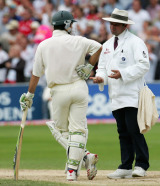
|
It was the 97th anniversary of the birth of Sir Donald Bradman today at the venue of his first Test century in England: the sort of historical resonance that usually causes an Australian's sap to rise, and reach for their favourite verse by Rupert McCall or John Williamson CD.
It did. Australia batted as productively in the second innings as it has since Lord's, and ended the day with Michael Clarke and Simon Katich in harness after the addition of 61 runs. Whether this will be enough is another matter. There is peril in writing Australia off even now, but the
historical antecendents might equally point England's way.
The last time England enforced the follow-on in an Ashes Test was almost exactly twenty years ago: August 31, 1985, when David Gower was England's captain, Margaret Thatcher the prime minister, Hulk Hogan the ruler of Wrestlemania and Anatoly Karpov the world chess champion. If these meanderings sound a little disoriented, that was the sort of occasion it was.
Katich's batting bookended the day, and it was in both instances purposeful. With Gilchrist, he began the morning's play as though intent on wiping the arrears away by lunch. Hoggard's third over of the day vanished for 22 including two no balls, three fours and a Gilchrist six beyond long-on. When Flintoff finally bowled a maiden to Gilchrist, it felt like an hour-long lull with piped music in the background.
The partnership had screeched to 58 at a run-a ball when Katich went searching for one a little wider from Hoggard's replacement, Simon Jones, and speared it to gully. When the next ball opened Warne up and skewed to point, the insurrection had been put down.
Flintoff again performed his party trick of snuffing out Gilchrist, from round the wicket. It was a shot Gilchrist need hardly have played, but above all a catch Strauss was hardly expected to reach. In fact, he delayed leaping to his left just an instant, then arched his back like a salmon
pushing upstream to stay airborne. When Australians used to take such catches like this, we used to nod sagely and say: `Well, y'know, that's the world's best cricket team.' Perhaps we still should.
Australia's innings was not quite yet done with, for Lee, whose impact on the series with the bat has perhaps been more profound than with the ball, plunged headlong into his highest Ashes score. His first six was into Fox Road, his second in the direction of the big screen, and his third looked at last sight to be heading to Derby. Lee also manipulated the strike with skill. After Jones had reversed the ball past Kasprowicz's outside edge, Tait had to face only nine of 37 deliveries in the 43-run last-wicket partnership.
The pyrotechnics looked likely to continue when Langer flailed at the first ball of the second innings from Hoggard, which bisected third slip and gully on the way to the third man fence. The reaction, if not the stroke, struck the tone of Australia's second innings, which seemed at the outset to be stopping only a micron or two away from harm.
Hayden lurched uneasily around the crease, occasionally toppling over like a tree under the axe. He played one splendid pull shot, then, as at Edgbaston and Old Trafford, began playing almost compulsively at deliveries of increasing width.
When Hayden is batting these days, the area outside off stump has become a kind of traffic black spot. One waits with trepidation for accidents to happen - and so, again, one did today. It would be illuminating to eavesdrop Michael Slater's real opinion of an opening batsman being selected
for an Oval Test after averaging 30 in his last thirty innings.
Langer found himself in the kind of situation suited to his monastic self-discipline, and played with admirable control. He, too, lived a little dangerously. It being the way of these things, Strauss missed a chance a good deal easier than the one he'd taken just hours earlier, albeit at that
awkward armpit height where catches sometimes look a good simpler than they are. Otherwise, he did not budge, flinch or even twitch. England were relieved when he offered Bell further bat-pad practice in the over after tea.
In the gloaming at Old Trafford, Worcestershire's Stephen Peters did not quite seize a chance to make a name for himself by throwing out Brett Lee. But today. Durham's Gary Pratt punished an optimistic call of Martyn's by hitting the striker's stumps direct from cover to find Ponting a foot short. Ponting stood by the ruined wicket while awaiting the third umpire's analysis in conclave with Aleem Dar, then seemed to suggest to Duncan Fletcher that England's coach might be wanted in his own dressing-room. A coach never knows when he might be needed to demonstrate the front foot defensive shot.
In truth, of course, England's free use of substitutes has aroused Australian ire since the Natwest Series, when Vikram Solanki was like a bachelor at a ball, his dance card crowded with engagements. In truth, too, everyone takes advantage of the ambiguity of the law regarding substitutes. In 1981 it was Australia, when because of a pre-existing bronchial condition, Dennis Lillee seemed to be allowed to go straight from bowling to his personal sauna and masseuse. In this case, however, Simon Jones seems to have been carrying a genuine injury, as he went to hospital for scans on his ankle at the stage when England would have been glad of his bowling let alone his fielding.
The episode may be more enlightening for what it reveals of the present height of Ponting's dudgeon. He has been out of sorts since the first day, when he rounded on umpire Bucknor for having the temerity to call his second ball a wide; Australia's captain would have preferred something a little more PC, like `ball of width'.
Ponting's ire might have been better directed today at his partner, who cantered off as though jogging round the block, and himself, who seemed a little surprised by the call and did not work up much of a head of steam. In other words, there may have been more than one Pratt involved in this interlude. It was a frightful waste of a wicket. Ponting had until then not made a mistake, and his pull shot for six from Flintoff was as delectable as the one he played on the last day at Old Trafford.
Martyn fell as Martyn does, flat-footed, neither forward nor back, too good to miss, not quite good enough to middle. It was left to Clarke and Katich to take advantage of the good batting conditions: there is life in this match yet, and chasing more than 200 on this pitch against Warne will not be a pushover.
On the day that the Daily Mail made official that Geraint Jones's "ability to score heavily outweighs his keeping foible", he failed to stump Clarke when the batsman was 35. Press theses aren't usually submitted to such an immediate examination, but here is one to watch.
Then, of course, there's that old Bradman spirit. Mind you, as tragics will already have been bursting to point out, Australia lost that Trent Bridge Test in which the Don made his first hundred. And the way this series is going, Hulk Hogan may be of just as much relevance.
Friday August 26
|
|

|
Jason Gillespie has given voice to what a number of Australian players feel in this morning's Mirror, complaining of hostile English crowds: "Some of the crowd behaviour is appalling, the insulting things people say. People pay their money to come in and they think it is their right to question your parentage and have a crack at your mother. It's always these guys that abuse you, call you effing this and effing that and 10 seconds later they are asking for an autograph for their kids. You say, 'Look mate, I'm not going to sign it for you', and all of a sudden you are the worst bloke in the history of the world, so you can't win."
It's hard to feel much sympathy with such protestations from an Australian, whose crowds have become steadily crasser and stupider. The first time I really had an insight into what visiting players put up with was in Perth ten years ago. I have a vivid recollection of sitting in a crowd listening to Phil Tufnell, fielding as a sub, being hounded from pillar to post. It ruined my enjoyment of the day, and I can only imagine what it did to Tufnell's. I attend most Australian Test matches as a spectator, and the general standard of crowd behaviour, exacerbated by the forces of face paint patriotism, now ranges, with certain honourable exceptions, from inattentive to abysmal. In the latest Test programme, Simon Jones reminisces being stretchered off the Gabba with his right knee cruciate, and his career, in disarray: "One guy in the crowd called me a weak pommy bastard and threw a can of Coke on me. That wasn't nice." Submerged in a mob, the smallest man can become a hero to himself.
What Gillespie is describing, though, is a general trend, not to increasing partisanhood, because fans have always been partisan, but to diminished inhibition. It is not altogether accurate to speak of 'spectators' anymore, because spectate is often the last thing they do; they crave becoming part of the pageant themselves, like contestants on a reality television show.
When sport is sold as a commodity, so is it consumed. And in what the historian Geoffrey Bailey has called 'the right society' - in which rights, whether to free speech or to bear arms, are not just defended but aggressively asserted - the right to abuse whom one pleases is considered inalienable. In this, television is more than a silent witness, making a point of hovering on the most demonstrative crowd members. In sociology, this is known as focusing on oppositional groups. On television, it's called entertainment.
The audiences this summer have provided an enjoyable sideshow. Rounding the Wyatt Stand after the Edgbaston Test, I encountered a game in which Queen Victoria batted to the bowling of Sherlock Holmes while Lord Nelson kept wicket, somehow perfectly in keeping with the atmosphere of the aftermath: it mingles now among my most cherish memories of that marvellous match. But it's a sideshow that should remain there: on the side, rather than trespassing on the action. A phrase becoming popular in England at the moment is that 'cricket is the new football.' Why would it want to be anything like the Augean stable of football, with its millionairhead players, venal administrators and sub-culture of crowd violence? English cricket should be careful what it wishes for.
Thursday August 25
|
|
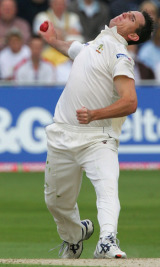
|
Nottingham was recently judged the second worst town in England by some television property pundits, which makes me wonder whether Kingston-upon-Hull could really be so bad. Nothing has disturbed the view I formed four years ago that it has the ugliest provincial city centre I have
ever seen, designed without care, or feeling, or even eyesight, such is its encrustation of visual pollution. Nottingham actually doesn't deserve a cricket ground as pretty as Trent Bridge, which was today as lovely as I remembered it: Gaddafi Stadium would better suit the environs.
This was an uneasy day of cricket, shortened by steady rain and fluctuating light, but also holding something back: it is hard to remember a day on which Shane Warne took the first wicket of a Test yet ended up at stumps having bowled a mere six overs. Batting after the resumption was more difficult than it promised to be, and the bowlers seemed to obtain better bounce and carry than in the morning. The teams ended the day pretty well deadlocked: one fewer wicket, and England would have felt satisfied; one more, and Australia could justly have claimed the ascendancy. The pitch has yet to proclaim itself. The weather has a bigger part to play. The first
hour of the second day will have a say in deciding the Ashes' destination - at the self-same venue at which they were determined in 1997 and 2001. It's too early to say whether Kasprowicz will have to mentally replay dropping Pietersen off his own bowling when the batsman was 14 for the rest of his life, as the second half of a double-bill with the last ball of the Edgbaston Test.
And 'Sloon'? After a tentative first spell, Shaun Tait was the best of the Australian bowlers, picking up Trescothick with a ball that the batsman flattered, and Bell with a delivery that the batsmen did not. Over the next decade or so, I fancy that Tait will bowl to Bell quite a deal: if so, round one to 'Sloon'. Further intelligence on the business of nicknames too. The
word is that Tait's alias during his fleeting and rather calamitous time at Durham a year ago was `Bambi', such was the diffidence with which he began approaching the crease after an early glut of no-balls. Today, after four early transgressions, he looked as sure footed as Red Rum.
Tait is half an inch shorter than the bowler he replaced, Gillespie, but looks bigger. Perhaps the older South Australian has pined away somewhat on this tour. With pace coming from the strength in his shoulders and the long sweep of a round arm, Tait looks like a throwback to the years before coaching and video made actions more uniform. The freezeframe of one of his
four no-balls made him look like an old-fashioned 1950s dragger: a Pat Crawford, or a Gordon Rorke. A billowing flannel shirt and he would have looked the part in a Pathe newsreel.
In his pre-match rhetoric - a sign of the times - Tait unabashedly confirmed that he saw hitting batsman as part of his intimidatory role. None batted an eyelid. Recall the bitter disapproval thirty years ago when Dennis Lillee opined in Back to the Mark that it wasn't such a bad idea to hit rivals in the ribs, and Jeff Thomson told The Cricketer magazine that the ball hitting a batsman's skull was "music to my ears". Such stuff is all pretty ho-hum nowadays, like the throat clearing that is transcribed as `5-0'; we'd happily write the lines for the fast bowlers ourselves if they'd let us. Tait, who will have enjoyed today, should bowl still better tomorrow. And whatever I think of it, he is bound to regard Nottingham with special affection in years to come.
Wednesday August 24
|
|
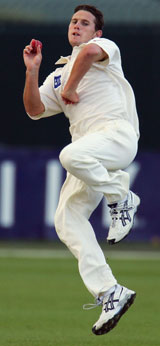
|
Australia's Shaun Tait has been cleared for his Test take-off tomorrow at
Trent Bridge, predictably at Jason Gillespie's expense. Good judges vouch
for his speed. Another aspect of the Australian performance that he will
improve is the general standard of nickname. Tait's soubriquet is one of
those rare ones that is not a pun or an informalisation by the attachment of
an '-y', but instead has a story behind it. On his first trip abroad with
Australia, a Sri Lankan hotel clerk could not transliterate Shaun into
anything more identifiable than 'Sloon'. It stuck.
Australia might have led the world at cricket over the last ten years, but
it has been a dire disappointment to connoisseurs of the nickname.
Nicknames as an Australian tradition go back at least to the Golden Age: 'Demon'
Spofforth, 'Terror' Turner, 'Paddy' Darling, 'Little Eva' Trumble,
'Lightning' McLeod, 'Clum' Armstrong, 'Mary Ann' Noble, 'Ranji' Hordern,
'Governor-General' Macartney. Who can forget such tight-fitting aliases as
'Jackson' Lindwall, 'Nugget' Miller, 'Ninna' Harvey, 'Griz' Grout, 'Phantom'
Lawry, 'Wallaby' Cowper, 'Fot' Lillee, 'Bacchus' Marsh? A personal
favourite is Richie Benaud's handle, 'Diamonds', in honour of his luck, was
settled on the great man by a remark of 'Dusty' Rhodes: "If you put your
head in a bucket of shit, Rich, you'd come up with a mouthful of diamonds".
The Aussies these days are a motley crew: Punter, Warney, Kasper, Marto,
Kato, Haydoszzzzzzzzz... Nothing intimate, evocative or even particularly
memorable there. But this is a long-term trend. A cricketer as
characterful as Ian Healy deserved better than 'Heals'; with so many
options, it is amazing teammates came up with something as lame as 'Pistol'
Reiffel; Mark Waugh was awarded a far better nickname by his countymen,
'Afghanistan' (the forgotten Waugh), than by his countrymen, 'Junior'. It's
ten years now since the last half-decent Aussie nickname: 'Fruitfly' Hughes,
the great Australian pest.
The best of the current bad lot is 'Churchy' Gilchrist, stemming from the
boy who at Derbyshire in 1997 came seeking the autograph of 'Eric
Gilchurch', who now seems like the man who accosted the Duke of Wellington
and addressed him as 'Mr Smith'. This is a good nickname because it
connects to a particular story, and a moment in Gilchrist's career when his
face did not stare from billboards and tour diaries: for Gilchrist to keep
it shows both humour and humility. If Tait keeps his nickname after
enjoying some success, 'Sloon' may begin to exhibit the same qualities.
Otherwise only the coach lands it in the right areas. 'Flanders' so suits
Buchanan that he should begin team meetings with the greeting "hi-del-I-ho
cricketereenos".
Why have cricketers nicknames become so naff? They are narrower than of
yore, because of professionalism. They spend less time off-piste, as it
were, at fixtures where they can relax and think about something other than
the forward press and the corridor of uncertainty. Their identities are
more public. Better a simple, dull epithet than one that might be twisted
or parodied: 'Becks' is exemplary in this respect. Above all they are
celebrities. Celebrities do not have nicknames. Brad 'Bottomless' Pitt?
Jude 'Possession-Is-Nine-Tenths-Of-The' Law? Nope. Celebrities, on their
pedestals, permit no such intimacy. Perhaps we shouldn't wish Tait so well.
Three-for and he'll probably stay 'Sloon'; five-for and there is a danger
he'll become 'Taity'.
Monday August 22
|
|
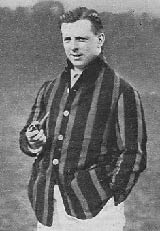
|
Spent the weekend in Brighton, and on a jaunt to the Isle of Wight, apparently far from cricket, but closer than I thought. On "The Island", as natives call it, is to be found the home of Alfred, Lord Tennyson, Poet Laureate: Farringford is now a hotel adjacent to a golf course, but the walls and a sizeable room are devoted to its distinguished former occupant.
Considering my remarks on 27 July, it was perhaps inevitable that at the bottom of one display case devoted to accoutrements of the author of The Charge of the Light Brigade et al I would find an autographed cricket ball: the Hampshire team of 1921 led by Tennyson's grandson Lionel, also the son of Australia's second Governor-General.
More extraordinary men have led England against Australia, but not many. A program for Lionel's coming of age party at Farringford shows him in the uniform of the 60th Infantry Brigade, and the First World War, in which he was wounded thrice, mentioned in despatches twice, and lost both brothers, was for better and worse the making of him. "The war," he commented in his autobiography From Verse to Worse, "was not exactly a circumstance to encourage the growth of moral precepts or to instil the maxim of `safety first'."
Tennyson tackled peacetime life with suitable abandon. A compulsive gambler, he bought himself a black and white Rolls-Royce, then had to sell it three weeks later after losing £7000 at roulette. He thought he'd recovered an equivalent sum shortly after, only to have the debtor explain that he would need to commit suicide to raise the necessary funds. A belligerent batsman, Tennyson hit hard off the front foot with a rudimentary technique: "He received the fast bowlers as the oak receives the storm," recalled Crusoe. "And, when he fell to them, he went down with no grace or compliancy, but with a sounding, defiant crash."
Tennyson was notified of his Test selection against Warwick Armstrong's Australians while "smoking my second cigar" at 1am at Bond Street's Embassy Club, and returned from failure in the first innings cheerfully dauntless: "Never mind. Next time, I'll get 50 for sure." He did better, hitting ten fours during an undefeated 74, which convinced England's selectors to make him captain. "If depression had settled like a blanket on the minds of most players," Tennyson recalled, "my cheerfulness seemed the proper antidote and the best chance of charming the fates."
The fates went uncharmed, but Tennyson was a crazy-brave skipper who made a half-century batting with his right hand alone after he split the webbing of his left in the field, and a man of uncompromising self-belief. Visiting the house of Armstrong's grandson a few years ago, I found a photo signed for the Big Ship by the Hampshire Gunboat: "To the best captain Australia ever had from the best captain England ever had." Enchanting a character as Tennyson was, however, I don't doubt which era fans of English cricket would prefer to have been born into. My reminder of the summer England's selectors picked 30 men came on the day that England's selectors confirmed an XII unchanged from that of the three preceding Tests.
Gideon Haigh is a cricket historian and writer, who is covering the Ashes tour for the Guardian. His diary will appear on Cricinfo every day. Click here for last week's entries.